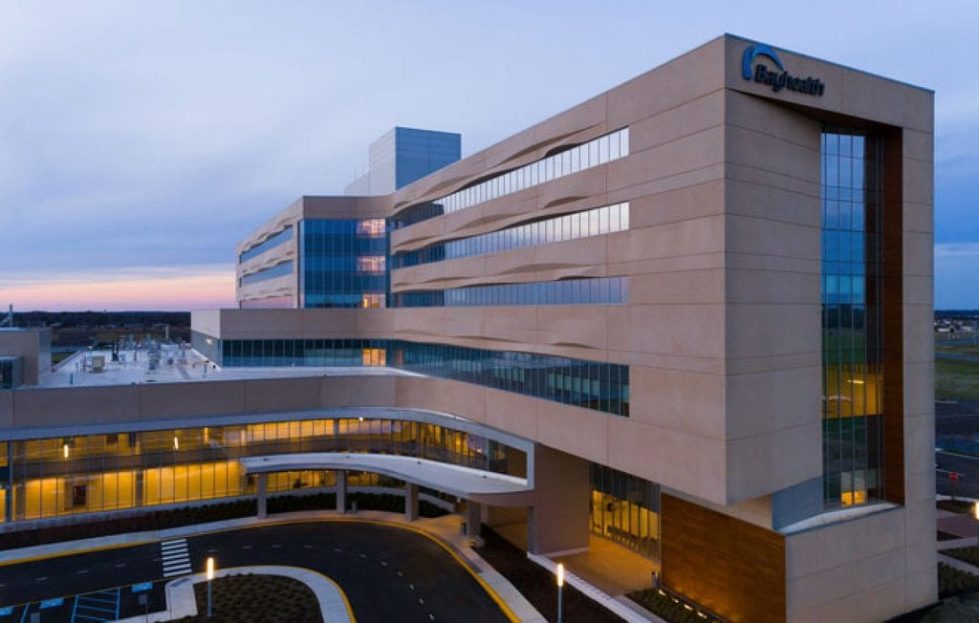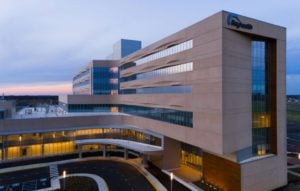by Terry Rogers
At a recent Milford Conversation, held on the first Thursday of each month at the First Presbyterian Church of Milford, several community organizations and city officials learned about the Bayhealth residency program and discussed challenges the residents faced when they arrived to begin their program.
“We are very excited about our undergraduate and graduate medical education programs, specifically our residency program,” Lindsay, Rhodenbaugh, D.Min., President of the Bayhealth Foundation, said. “Last time I was here, we spoke about our Bayhealth Sussex Campus which has been open over three years now, it is hard to believe so much time has gone by.”
Rhodenbaugh introduced Dr. Brintha Vasagar, Director of the Family Medicine Residency Program, and Dr. Joseph Deutsch, Director of the Internal Medicine Residency Program. Vasagar explained how to “grow a doctor,” stating that it takes years and years of not only education, but also hands-on learning. Residency is designed to give medical students hands-on experience under the supervision of an experienced doctor. Bayhealth currently has three residency programs up and running, in internal medicine, family medicine and surgery. They are currently seeking approval for an emergency medicine program that they hope to start in the next year. After both Vasagar and Deutsch provided details about how the residency programs worked, they opened up the discussion to questions. Janne Collins, Executive Director of DMI, asked what the community could do to help the new residents.
“I think the number one issue has been, of course, the effects of the pandemic,” Vasagar said. “But the most challenging they are telling us is housing. They are telling us they are spending half their paycheck every month on housing, so it’s less than ideal.”
One of the issues the residents and the hospital have is that all residency matches are now virtual. Vasagar explained that the entire residency match process was “archaic and mildly abusive.”
“Students all over the country apply to as many programs as they are interested in attending,” Vasagar said. “They can apply for family medicine or only internal or they can say they want to keep the net really wide open to see what they get. Certain specialties are much more competitive, like radiology and dermatology. So, maybe you have some backup choices. So, it’s a little bit of a game really. You cast your net and you get offers for interview from various programs. We are not allowed to ask why they are applying to Bayhealth and we cannot see where else they are applying. We get electronic applications and we set up interviews from there.”
Prior to the pandemic, medical students would be required to come to the hospital for an interview, but now the entire process is virtual. This can make it difficult for those who have never been to the area. Vasagar said they often receive applications from people who have never even visited Delaware. Once the interviews are over, the students rank their top choices and the hospital rank theirs.
“If they’re on your list, and you match their list, that’s a three-year commitment,” Vasagar said. “So, if you really hated it, your choices are not putting it on your list and risk going unmatched and not becoming a doctor this year. So, it is a huge risk and why I say it is mildly abusive. In the old days, we should go to the schools and give talks, go to recruiting conferences and try to interact with as many humans as possible, but COVID. So, we’ve done some virtual webinars, some virtual recruitment fairs, but that makes it difficult for a new program. This year, it has finally started to open back up and we just did a recruitment fair in Washington, DC.”
Dr. Mitch Edmondson and his wife, Dr. Loretta, who operated a practice in Milford together before retiring recently, offered additional information related to difficulties faced by residents.
“There are a couple challenges,” Dr. Mitch said. “One is the cost of medical education for medical students is extremely high. The average debt for physicians, when they go into practice, they are already $200,000 to $300,000 in debt and that’s before a place to live or anything else. And that’s a challenge across the country and really a challenge here in Delaware because the loan repayment programs compared to other areas are weak. The other challenge is there is a crisis in payment in primary care in Delaware. It’s changed a bit due to some legislation, but traditionally, Delaware has been at the bottom for reimbursement for primary care. That has got to change and that’s an issue that’s bigger than Milford or Dover. It’s an issue for state legislature and our national leaders.”
Another area where Bayhealth is expanding is with a new Total Care facility on the corner of Route 9 and Hudson Road. The new facility will be a hybrid emergency department, open 24-hours, seven days a week.
“It’s not duplicated anywhere in Delaware or this immediate area,” Rodenbaugh said. “When folks fall ill or are hurt, it sometimes does not happen during convenient hours. It doesn’t happen when your doctor’s office is open. They happen on the weekends or overnight. I, myself, have had two heart attacks. Receiving emergency care is vitally necessary. That is where I needed to be when I was in the midst of having a heart attack. It was an urgent need, and I was likely to die if I did not get some care quickly. But lots of people present at our emergency department because they don’t have a primary care doctor and they often do not need immediate, urgent care. ED treatment is the highest level care and the most expensive care you can receive. But you may not need something like Level 3 Trauma Care.”
Rodenbaugh stated that the new facility would offer high level trauma care, but patients who visit there would be triaged and evaluated to determine what level of care they needed. If they needed minor care, such as stitches for a cut or x-rays for a sprained ankle, they would receive that care and insurance would be billed for that level care. However, if they presented with a serious issue, such as a heart attack or stroke, they would receive that level of care at the same facility. When asked if patients presenting to the emergency department whose illnesses or injuries were not serious had an impact on wait times for those who may be seriously ill, Rodenbaugh emphatically stated it was.
“Oh God yes,” Rodenbaugh said. “There’s no question that the pandemic made that worse, but I look at some trends. Our electronic medical record system showed wait times in January and February were terrible. Wait times got to be 12 hours or more and nobody wants that. WE don’t want that, patients don’t want that. WE put some things in place to address this issue, but this is a crisis across the country. It’s getting much better now, but certainly that is a big issue.”
Alice Rausch, Southern Strategy and Brand Program Manager for Bayhealth, explained that this was one of the reasons Bayhealth implemented their new virtual urgent care program. With that system, patients can log in via computer and have a virtual appointment to determine if they need to visit the emergency department, could use a walk-in clinic or could wait until their family physician was in the office. Rodenbaugh stated that one of the best telehealth doctors Bayhealth had was Dr. Vincent Lobo who had embraced the virtual method for providing care.
With housing being one of the primary issues facing residents, a question was posed whether Bayhealth had considered working with a realtor and offering subsidies or other methods to offset rents for new people coming in. Deutsch stated that he was not aware of such a program currently. After the meeting, Dr. Loretta, Sarah Bluhm with the City of Milford, Trish Gerken with Milford School District and Deutsch discussed some of the methods Bayhealth has used in Dover to acclimate residents.
“We did a small bus tour of the area,” Deutsch said. “We took them around to various places they could shop, restaurants, schools, we rode out to Harvest Ridge Winery. This was one of the ways we were able to provide them with a sense of what was available in the area.” Bluhm asked how they could get a similar tour in Milford that may encourage some of the residents to choose Milford as a place to put down roots. Deutsch stated that he felt that would be an excellent way to attract residents to southern Delaware.
Share this Post




